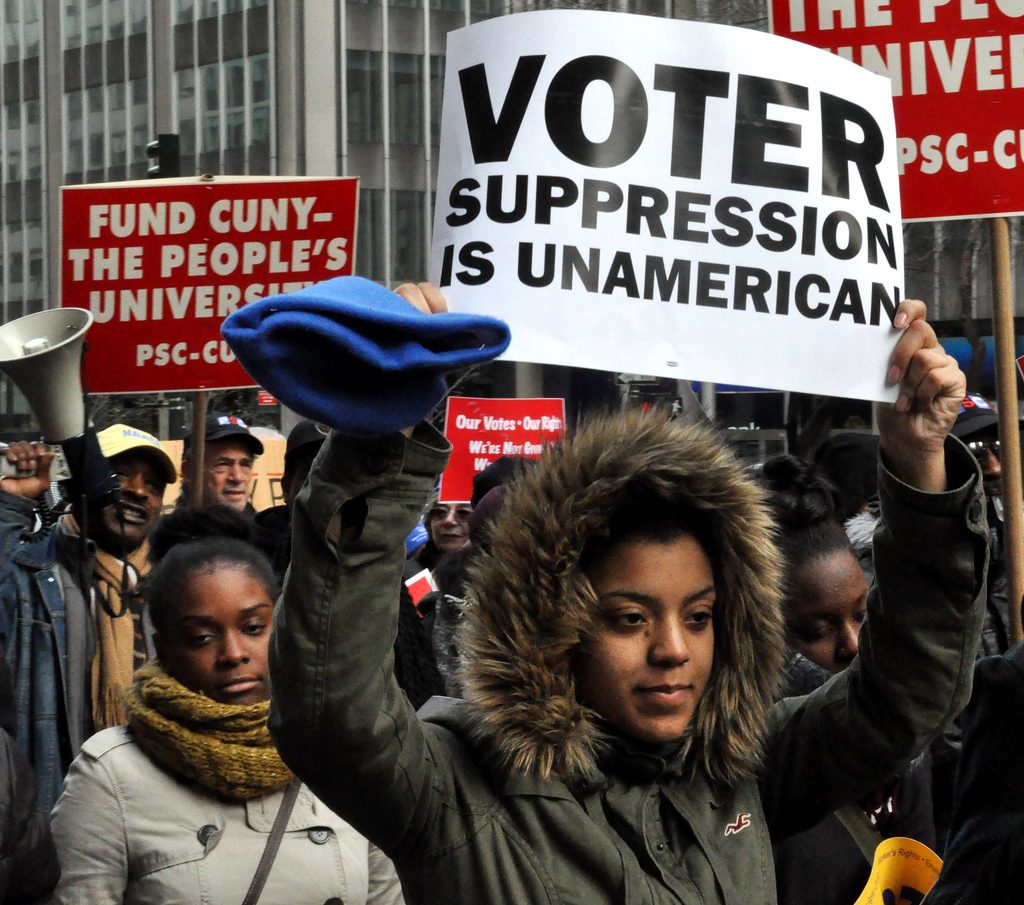By Morgan Moone, Associate Editor

[dropcap]A[/dropcap]fter the confirmation of Brett Kavanaugh to the Supreme Court, #midterms2018 began trending and organizations called for young women to let their voices be heard by their vote. Many organizations hosted phone banks and information sessions on how, when and who to vote for. Voting is a political tool that is critical in a functioning democracy and is rightfully recognized as such. Because of its importance, the lack of inclusion of voting rights in the current women’s movement, and the lack of discussion around disenfranchised communities is concerning. Current movements forget that not all of its members can vote and many times, disenfranchised folks are left out of the conversations surrounding organizing and mobilizing voters.
While the focus of the #GlobalFeminism series focuses on global issues, this particular piece focuses on the United States’ broken electoral system. Specifically, this piece critiques the long history of the United States in excluding black voters from polls and the failure of current women’s movements to understand the necessity of ensuring that all folks’ voices are heard, regardless of their ability to participate in elections.
Silenced by Disenfranchisement
[dropcap]P[/dropcap]redicating political and social change solely on voting is not only wrong, it’s exclusionary. It devalues the voices of those who cannot vote and excludes them from mobilization efforts premised on the assumption that all folks in the United States can engage in elections. It demonizes those who do not vote without considering the structural systems in place that prevent hundreds of thousands from voting each year.
The Sentencing Project found that 6.1 million Americans cannot vote because of a prior felony conviction.
Systematic and active disenfranchisement of residents of U.S. colonies such as Puerto Rico, Guam, the American Samoa and US Virgin Islands perpetuates centuries old colonialism in a new form.
Native Americans are being subject to stricter voter ID rules requiring street addresses, as opposed to other addresses such as post office boxes. In addition to disenfranchising homeless folks or those in temporary living situations, it also excludes those living with other tribal members who “aren’t always aware of their address.”
Exact match laws disenfranchise thousands of individuals, including folks who recently attained U.S. citizenship.
The inclusion of voting rights in the larger feminist movement is critical; it showcases the intersections of identities that are most vulnerable to government silencing. “Modern” feminists must address voter suppression, either direct or indirect, by facing the problem head on and understanding the racist and sexist policies behind the suppression. LaTosha Brown, co-founder of Black Voters Matter, says “If 51% of our population is women, why isn’t that reflected in political leadership and representation? We know we have work to do because the sheer numbers show that women are underrepresented. When people are looking to control our bodies and what we do with our bodies, looking at unequal pay and policies that impact women at a disproportionate rate, voting rights is key and center. If you’re marginalizing women’s voices, you’re marginalizing the power to change and transform sexist and biased policies.”
We are still working in that ‘we’ll come get you later,’ and that’s the way oppression works and continues. Ria Thompson-Washington
The power behind voting should not be understated and the fact that so many are being denied this right cannot be ignored. It is “our duty to think about the political interests of everyone, of every woman,” including those who are denied the right to vote.
Women’s Liberation Beyond Elections
[dropcap]B[/dropcap]lack Lives Matter Cincinnati withdrew from the 2018 Cincinnati Women’s March after its suggestion to change the theme from “Hear our vote” to “Hear out voice” was denied. The demand to hear the vote, they said, “disenfranchises countless black women and women of color” in addition to “totally miss[ing] the point of women’s liberation.” Not every person in the United States has a vote – whether because of “immigration status, age, prior criminal conditions, access to official identification, transportation issues.” And, even if everyone did have a vote, the “electoral system does not let anyone vote their way to liberation from oppression.”
Ria Thompson-Washington, voting right activist, Executive Vice President of the National Lawyers Guild and Senior Coordinator a Lawyer’s Committee for Civil Rights, expressed discontent at the fact that only some people view voting rights work as racial justice work. Organizations and movements, such as the current wave of women’s activism, were not “born out of intersectionality. It was born because 53% of women who voted for Trump are trying to make themselves feel better for what happened.” It is, once again, white women’s voices being heard the loudest, both at the polls and on the streets.
The reason dissenters spent so much time and effort preventing the Black female community from voting, and continue to create systems that make voting difficult, is because they know how powerful our vote is. Nia Weeks
The current movement focusing around folks voting while ignoring those who are disenfranchised mimics that of the suffragettes. “White women, while getting the right to vote, put off the needs of black women to be included in that space. It was always ‘we’ll come get you later.’ But I don’t think we’ve diverged from that model. We are still working in that ‘we’ll come get you later,’ and that’s the way oppression works and continues.”
The women’s movement’s failure to recognize that its supporters, and those it is supposed to be fighting for, include those who do not have the right to vote, excludes radical change-makers from its activism. It denies those who are already voiceless in the American democratic system an opportunity to be heard. It continues oppression and disenfranchisement of vulnerable communities from the larger rallying cry. It threatens women who vote consistently. “No one cares that black women have been carrying elections and voting hard and regularly,” Thompson-Washington says. “How is this supposed to continue?”
Voting Rights and Ending Disenfranchisement
[dropcap]B[/dropcap]lack-led organizations are creating electoral strategies that recognize the importance of voting and simultaneously work towards ending disenfranchisement. Black Voters Matter works towards increasing voter registration as well as advocating for policies to expand voting rights and access by recognizing the intersections of race, gender and economic aspects of equity. Black Lives Matter Cincinnati, which is now Mass Action for Black Liberation, practices “independent, revolutionary political action,” while simultaneously recognizing the importance of the ballot box.
Stacey Abrams, running for Georgia governor, is tackling this battle head on in Georgia’s elections. Brian Kemp, her opponent and the Secretary of State for Georgia, has systematically disenfranchised voters who threaten his campaign. Abrams’s spokesperson, Abigail Collazo, stated that he “is maliciously wielding the power of his office to suppress the vote for political gain and silence the voices of thousands of eligible voters — the majority of them people of color.”
After reaching out to Abrams, her campaign sent Law@theMargins a clip of Abrams’ appearance on The View. In it she stated that Kemp has been an “architect of voter suppression,” and noted that his actions of purging, stopping and arresting voters of color has injected racial bias into the electoral system, disenfranchising those with a Constitutional right to vote.
Abrams’ campaign realizes that this disenfranchisement disproportionately affects women, too. Nikema Williams, a state senator and the Georgia state director of Care in Action who is helping canvas for Abrams, told Huffington Post that this election necessarily impacts women: “It’s about reclaiming our power, reclaiming our voice and making sure that our issues are uplifted, because we are living these issues every day as women of color here in the South.”
Kemp’s active efforts to purge voters impacts women’s access to medicaid and obstetric care, a living wage, and reintegration programs for folks leaving the prison by denying them the ability to vote for a candidate who will fight for those rights. Nia Weeks, Founder and Executive Director of Citizen SHE United, says “the reason dissenters spent so much time and effort preventing the Black female community from voting, and continue to create systems that make voting difficult, is because they know how powerful our vote is.” In 2008 and 2012, black women voted at a higher rate than any other group. Four years ago, 74 percent of eligible black women went to the polls – and 96 percent voted for President Obama.
Brown notes that we need radical revolutionary change, and we do that by centering those who have been most marginalized. “Voting rights has always been a gender issue in this country, and when you couple that with race, race has always made women extremely vulnerable in voting spaces.” If we’re looking for a new system, we must place people and, specifically, women in power that are a part of and chosen by the community. And we can only get there by including voting rights in our larger feminist agenda.




